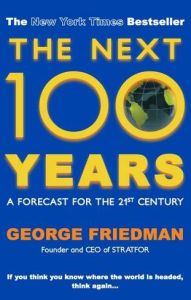Join getAbstract to access the summary!

Join getAbstract to access the summary!
George Friedman
The Next 100 Years
A Forecast for the 21st Century
Doubleday Broadway, 2008
What's inside?
Checking the crystal ball: If you wonder what the next 100 years will be like, consider these geopolitical predictions.
Recommendation
In this bold, lively and entertaining book, political strategy researcher and analyst George Friedman makes highly specific predications about the 21st century. His discussion of the globe’s changing face educates readers about the forces shaping international politics. Friedman is committed to a wide geopolitical perspective, and his predictions rest on broad, detailed historical knowledge. Even if you think some predictions are farfetched (or too specific for such long time frames), the parallels he draws between what happened historically and what he believes will happen in the future are quite educational. getAbstract recommends Friedman’s book to professionals involved in international business or long-term strategic planning, and to any reader interested in pragmatic, interesting and, of course, theoretical, assertions about the future.
Summary
About the Author
George Friedman, author of America’s Secret War, is founder and CEO of STRATFOR, a private intelligence and forecasting company.
























Comment on this summary